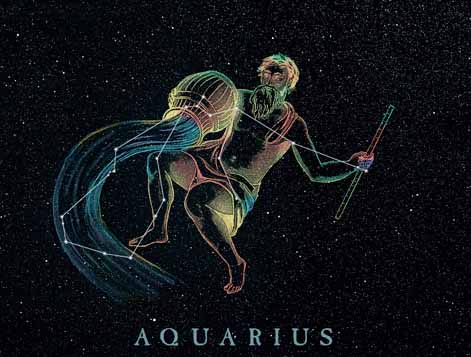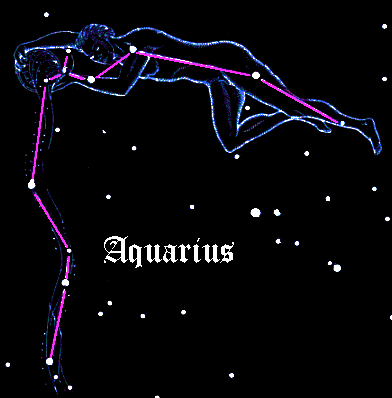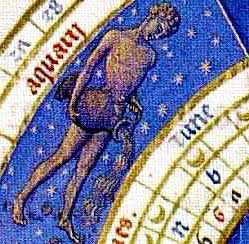
January 20 - February 19
Aquarius is an Air Sign
Aquarius is a Fixed Sign

Aquarius is ruled by Uranus

January 20 - February 19
Aquarius is an Air Sign
Aquarius is a Fixed Sign

Aquarius is ruled by Uranus

Aquarius is the eleventh astrological sign in the Zodiac, originating from the constellation Aquarius. It spans the 300-330th degree of the zodiac, between 305.25 and 332.75 degree of celestial longitude, which In the Tropical zodiac the Sun transits this area on average between January 21 to February 18 each year.
In astrology, Aquarius is considered a masculine, positive (extrovert) sign. It is also considered an air sign and is one of four fixed signs.Aquarius has been traditionally ruled by the planet Saturn, and, since its discovery, Uranus has been considered a modern co-ruler of this sign. Some say the exalting planet is either Mars or Neptune, while the fall planet is Venus and the Planetary Joy is Jupiter or Mercury.
In Western conceptions of astrology an individual born under this Sun sign is known as an Aquarian. Although the astrological sign of Aquarius may begin as early as January 19 in some years, the Sun typically leaves Capricorn and enters Aquarius on the cusp day January 20. The Sun is in Aquarius under the tropical zodiac from approximately then to February 19.
Under the Sidereal Zodiac, the Sun is in the astrological sign of Aquarius from February 12th to 14th and leaves between March 8th and 10th, depending on leap year. According to Hindu Astrology, which uses the Sidereal Zodiac, one can be an Aquarius at any time of year, as the defining factor of personality is interpreted from the Zodiac sign rising on the Eastern Horizon at the specific time of birth, rather than the astronomical transit of the Sun.
As Aquarius is said to govern the legs from knees to ankles and the circulation of blood, its natives are susceptible to ailments particularly in the legs and ankles, such as cramps, and are also liable to spasmodic and nervous complaints, as well as wind, catarrh, diarrhea, dropsy, goiter and delirium tremens - so that the avoidance of alcohol is important for those Aquarians who have a taste for it.
Positive Aspects:
Friendly and humanitarian
Honest and loyal
Original and inventive
Independent and intellectual
Negative Aspects:
Intractable and contrary
Perverse and unpredictable
Unemotional and detached
Aquarians basically possess strong and attractive personalities. They fall into two principle types: one shy, sensitive, gentle and patient; the other exuberant, lively and exhibitionist, sometimes hiding the considerable depths of their character under a cloak of frivolity. Both types are strong willed and forceful in their different ways and have strong convictions, though as they seek truth above all things, they are usually honest enough to change their opinions, however firmly held, if evidence comes to light which persuades them that they have been mistaken.
They have a breadth of vision that brings diverse factors into a whole, and can see both sides of an argument without shilly-shallying as to which side to take. Consequently they are unprejudiced and tolerant of other points of view. This is because they can see the validity of the argument, even if they do not accept it themselves. They obey the Quaker exhortation to "Be open to truth, from whatever source it comes," and are prepared to learn from everyone.
Both types are humane, frank, serious minded, genial, refined, sometimes ethereal, and idealistic, though this last quality is tempered with a sensible practicality. They are quick, active and persevering without being self-assertive, and express themselves with reason, moderation and sometimes, a dry humor.
They are nearly always intelligent, concise, clear and logical. Many are strongly imaginative and physically intuitive, so that the Age of Aquarius, which is about to begin, is much anticipated by psychic circles as an age in which mankind will experience a great spiritual awakening. The Aquarian philosophical and spiritual bent may be dangerous in that it can drive the subjects into an ivory-tower existence where they meditate on abstractions that bear little relevance to life. On the other hand it can help the many who have scientific leanings to combine these with the
Aquarian yearning for the universal recognition of the brotherhood of man, and to embark on scientific research to fulfill their philanthropic ideals of benefiting mankind. When some cause or work of this nature inspires them, they are capable of such devotion to it that they may drive themselves to the point of exhaustion and even risk injuring their health.
Both types need to retire from the world at times and to become temporary loners. They appreciate opportunities for meditation or, if they are religious, of retreats. Even in company they are fiercely independent, refusing to follow the crowd. They dislike interference by others, however helpfully intended, and will accept it only on their own terms. Normally they have good taste in drama, music and art, and are also gifted in the arts, especially drama.
In spite of the often intensely magnetic, forthcoming and open personality of the more extrovert kind of Aquarian, and of their desire to help humanity, neither type makes friends easily. They sometimes appear to condescend to others and take too little trouble to cultivate the acquaintance of people who do not particularly appeal to them.
They do not give themselves easily - perhaps their judgment of human nature is too good for that - and are sometimes accounted cold. But once they decide that someone is worthy of their friendship or love, they can exert an almost hypnotic and irresistible mental attraction on them and will themselves become tenacious friends or lovers, ready to sacrifice everything for their partners and be faithful to them for life. However, they are sometimes disappointed emotionally because their own high personal ideals cause them to demand more of others than is reasonable. And if they are deceived their anger is terrible. If disillusioned, they do not forgive.
Aquarians work best in group projects, provided that they are recognized as having a leading part in them. They have a feeling of unity with nature and a desire for knowledge and truth that makes them admirable scientists, especially astronomers and natural historians.
They may excel in photography, radiography, electronics - anything connected with the electrical and radio industries - aviation and everything technical. On the arts and humanities side their progressive tendencies can be expressed in writing, especially poetry, and broadcasting, or as welfare workers and teachers. Some have gifts as entertainers and make good character actors (having an ability to mimic) and musicians. The more psychic among them possess healing gifts, especially in curing the mentally sick.
Among the faults to which they are liable are fanatical eccentricity, wayward egotism, excessive detachment and an inclination to retreat from life and society, and a tendency to be extremely dogmatic in their opinions. Circumstances - for example, continuous opposition to a cause they hold dear - may cause the atrophy of the openness of mind that is one of the Aquarian's most attractive traits. They may express a lack of integrity in broken promises, secretiveness or cunning. Simmering anger and resentment, rudeness or, worse, a tense, threatening silence which may suddenly burst out in eruptions of extreme temper, these are all part of the negative side of the Aquarian. This can also reveal itself in a sustained hatred for enemies that is capable of enlarging itself into a misanthropy toward the whole of mankind.

Aquarius is one of the oldest of the recognized constellations along the zodiac (the sun's apparent path). It was one of the 48 constellations listed by the 2nd century AD astronomer Ptolemy, and it remains one of the 88 modern constellations. It is found in a region often called the Sea due to its profusion of constellations with watery associations such as Cetus the whale, Pisces the fish and Eridanus the river.
The stars of Aquarius lie between those of Pisces and Capricornus along the ecliptic. To the north is the Great Square of Pegasus, and to the south is the first-magnitude star Fomalhaut. Thus it is an important star group, although it has only a few important stars. Its alpha star, Sadalmelik, is only at magnitude 3.2, and there are only about 20 other stars brighter than fifth magnitude. However, some of these stars form asterisms, star patterns such as the Water Jar, a trefoil (resembling the Mercedes-Benz symbol) of Pi, Gamma, and Eta-Aquarii surrounding Zeta. This Y-shaped group lies to the east of Sadalmelik. Zeta-Aquarii is one of a number of interesting double stars. It is a beautiful pair of fourth-magnitude stars separated by about 3 arcseconds. The colors of the pair are given as pale green and pale yellow. Another star of note is R-Aquarii, a Mira-type variable star which, over the space of a year, changes from a dim magnitude 11 to a magnitude of six.
There are three Messier objects in Aquarius, including M2 and M72, both globular clusters. M2 is one of the better clusters and one which can be visible to a keen-eyed observer on a really dark night. In a small telescope it becomes a ball of faint stars of magnitude 13. M73 is a rather unusual object among those listed by Messier. It is only a small group of stars of similar magnitude that are possibly associated as a multiple-star system. It is also referred to as NGC 6994. First observed in October 1780, M73 was described by Messier as three or four small stars which look like a nebula at first sight and contain a little nebulosity. Yet no photograph of M73 has ever revealed nebulosity around these stars. The four stars form the shape of a Y, and their magnitudes range from 10.5 to 12.0.
Two planetary nebulae take preeminence in a long list of other deep-sky objects in Aquarius. The Saturn Nebula, when seen through a telescope, is a small blue-green dot that Lord Rosse thought looked like a ringed planet.
The other, the Helix Nebula, NGC 7293, is the closest planetary nebula to us and occupies an area about half the diameter of the full Moon. This marvelous deep-sky object can be seen in binoculars from dark skies. A cloud of gas and dust ejected from a central star, it resembles a dim smoke ring. Planetary nebulae were named by Sir William Herschel in 1785 because in telescope views they may resemble planets. About a thousand of these shells of stars in their final stages of evolution from giants to dwarfs are known. The central stars are usually blue in color with temperatures up to 400,000K.
The planet Neptune was discovered among the stars of Aquarius 154 years ago, in 1846, after its presence had been predicted and calculated from irregularities in the orbit of Uranus. Aquarius is also the radiant location for several meteor showers, including the Eta Aquarids of May, the North Delta Aquarids which peak on July 29, the South Delta Aquarids which peak on August 13, and the lesser Iota Aquarids, also of Augus.

Aquarius is associated with water, rain, floods and fountains. In many ancient cultures, including Babylonian, Egyptian and Grecian, there was a god known as the 'Water Bearer' or 'Water Pourer.' Water is the bringer and sustainer of all life; therefore the force that made water rain down from the heavens was among the most revered by ancient peoples. Water also represents the collective unconsciousness - the sea of creation or consciousness.
Mesopotamia: associated with the eleventh sign, the eleventh month and the return of the deluge.
Babylonia: Aquarius represented an overflowing urn, and they associated this with the heavy rains which fell in their eleventh month.
Persian, Syrian and Turkish languages call Aquarius the Water Bucket.

Egypt: the setting of Aquarius in the Nile caused its flooding. In Egyptian mythology, he pours water into the Nile River at the season when the Nile normally overflows its banks, this brings the much needed water to the farmlands bordering that great river. The Egyptians saw the constellation as Hapi the god of the Nile.
Arab dependency on the water of the rainy season, saw Aquarius as a bucket because their religion forbids them from showing pictures of any living form.
India: Aquarius is the first sign of the zodiac in India, where its patron saint is Varuna. This ancient god was originally the all-powerful lord of all the heavens and creator of the stars. But later he was looked on as just god of the water who looked down on the Earth through the thousand eyes of the stars. From his throat issued the seven streams of heaven. Varuna patrols his realm on a fabulous steed, half crocodile and half bird. So he is quite able to patrol both the air and the sea. Around 3000 BC it was possible to observe the full moon in this constellation every year around the time of the summer solstice, an event that was cause for celebration. This time represented the triumph of the moon god, Chandra, when he reached his maximum splendor and was drunk by the sun, Indra. Chandra was also identified with the magical drink of the gods, soma. With the sun crossing the solstice and the lengthening of daylight, the evil god of darkness and drought, Vritra represented by the constellation Hydra, was conquered. In India, the summer solstice corresponds with the return of the monsoon season and water to the land.
Peru: associated with the entrance of the sun into the constellation of the Mother of the Waters.
Christians of 17th Century: Christians of 17th Century: associated the constellation with St. John the Baptist

Greece: In antiquity, Hera's daughter Hebe, goddess of eternal youth, was cup bearer to the gods. Zeus replaced her with the handsome boy, Ganymede, after she spilled a flask of nectar. To further irritate Hera, Zeus immortalized his favorite server with a heavenly constellation. This is the first indication of male homosexuality in Greek literature.
Myth about Deucalion, the only man to survive the alleged Great Flood. The story of this flood is very similar to the Judeo-Christian legend of Noah's Ark. It took place during the time named by Greek legend as the Iron Age.
Zeus had noticed this couple during his last visit to Earth. They lived alone in a simple hut. They had almost no food, and definitely had no material goods. Despite this, they fed Zeus, gave him shelter for the night and spoke kindly to him, even though they had no idea that he was a god. They were the last godly people on Earth, so Zeus allowed them to survive the flood. After it ended, he helped them to create a new race of men, which was supposed to be stronger and better. Deucalion is known as the 'Water Bearer' because he not only lived through the flood, but he helped to bring life to a new generation.
Greek Legend 1:
The water carrier represented by the zodiacal constellation Aquarius is Ganymede, a handsome Phrygian youth. Ganymede was the son of Tros, king of Troy (according to Lucian, he was also son of Dardanus). While tending his father's flocks on Mount Ida, Ganymede was spotted by Jupiter. The king of gods became enamored of the boy and flew down to the mountain in the form of a large bird, whisking Ganymede away to the heavens. Ever since, the boy has served as cupbearer to the gods.
Greek Legend 2:
Ganymede was an exceptionally handsome, young prince of Troy. He was spotted by Zeus, who immediately decided that he would make a perfect cup-bearer. The story then differs - one version telling how Zeus sent his pet eagle, Aquila to carry Ganymede to Olympus, another that it was Zeus, himself, disguised as an eagle, who swept up the youth and carried him to the home of the gods. In either case, once Ganymede arrived, he had to contend with the wrath of Hera, wife of Zeus.
She was annoyed on two counts - firstly, that her husband should have such strong feelings for a mere boy and, secondly, that Ganymede was to occupy the favored position previously held by her own daughter Hebe, goddess of youth. But Zeus was not to be thwarted and Ganymede, often riding on Aquila and always carrying the golden cup, accompanied the great god on his travels, impressing him with his kindness. This was made manifest when, realizing how in need of water the people on earth were, he pleaded with Zeus to be allowed to help them and was given permission to send down rain. Eventually he was glorified as Aquarius, god of rain, and placed amongst the stars.
Greek Legend 3:
Zeus was the Water Bearer. Although he was the god of many things, one of his most important roles was as the god of storms. The constellation Aquarius could have originally been representative of Zeus as the Water Bearer.

There are different thoughts about the beginning of the Age of Aquarius but as time is an illusion none of that matters. Some believe it has already begun while others say it is a few hundred years away. Precession of the Equinoxes. Aquarius is the return of mythological Flood Stories paralleled now by Earth Changes - earthquakes, climate, volcanic eruptions. more.
